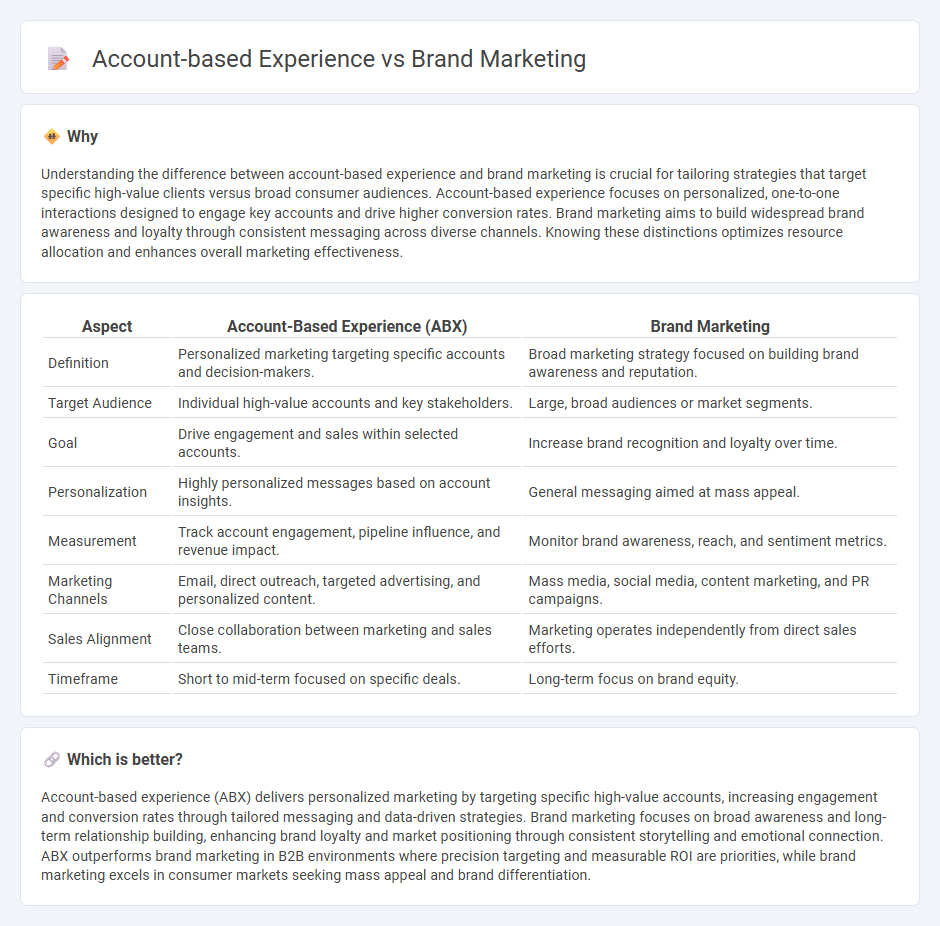
Account-based experience focuses on personalized marketing strategies targeting specific high-value accounts to increase engagement and conversions. Brand marketing aims to build broad awareness and loyalty by promoting a consistent brand message across diverse audiences. Explore the differences to determine the best approach for your marketing goals.
Why it is important
Understanding the difference between account-based experience and brand marketing is crucial for tailoring strategies that target specific high-value clients versus broad consumer audiences. Account-based experience focuses on personalized, one-to-one interactions designed to engage key accounts and drive higher conversion rates. Brand marketing aims to build widespread brand awareness and loyalty through consistent messaging across diverse channels. Knowing these distinctions optimizes resource allocation and enhances overall marketing effectiveness.
Comparison Table
| Aspect | Account-Based Experience (ABX) | Brand Marketing |
|---|---|---|
| Definition | Personalized marketing targeting specific accounts and decision-makers. | Broad marketing strategy focused on building brand awareness and reputation. |
| Target Audience | Individual high-value accounts and key stakeholders. | Large, broad audiences or market segments. |
| Goal | Drive engagement and sales within selected accounts. | Increase brand recognition and loyalty over time. |
| Personalization | Highly personalized messages based on account insights. | General messaging aimed at mass appeal. |
| Measurement | Track account engagement, pipeline influence, and revenue impact. | Monitor brand awareness, reach, and sentiment metrics. |
| Marketing Channels | Email, direct outreach, targeted advertising, and personalized content. | Mass media, social media, content marketing, and PR campaigns. |
| Sales Alignment | Close collaboration between marketing and sales teams. | Marketing operates independently from direct sales efforts. |
| Timeframe | Short to mid-term focused on specific deals. | Long-term focus on brand equity. |
Which is better?
Account-based experience (ABX) delivers personalized marketing by targeting specific high-value accounts, increasing engagement and conversion rates through tailored messaging and data-driven strategies. Brand marketing focuses on broad awareness and long-term relationship building, enhancing brand loyalty and market positioning through consistent storytelling and emotional connection. ABX outperforms brand marketing in B2B environments where precision targeting and measurable ROI are priorities, while brand marketing excels in consumer markets seeking mass appeal and brand differentiation.
Connection
Account-based experience (ABX) enhances brand marketing by delivering personalized and relevant interactions tailored to specific high-value accounts, fostering deeper engagement and stronger customer relationships. By aligning marketing efforts with targeted account needs and preferences, ABX drives more effective brand positioning and differentiation in competitive markets. This integrated approach maximizes return on investment (ROI) by focusing resources on high-impact accounts, resulting in increased brand loyalty and revenue growth.
Key Terms
**Brand Marketing:**
Brand marketing emphasizes building broad awareness, emotional connections, and long-term loyalty by consistently communicating a company's core values and unique selling propositions across multiple channels. It targets a wide audience to establish a strong brand identity and reputation, leveraging storytelling, visual design, and messaging coherence. Explore how brand marketing strategies can elevate your market presence and drive sustained growth.
Brand Identity
Brand marketing centers on establishing a strong brand identity by communicating consistent values, visuals, and messaging that resonate with a broad audience, fostering recognition and loyalty. Account-based experience (ABX) tailors personalized interactions and content to specific high-value accounts, emphasizing customization over a generalized brand persona to drive engagement and conversion. Explore how integrating brand identity with ABX strategies can elevate your marketing effectiveness and deepen customer relationships.
Brand Awareness
Brand marketing emphasizes broad brand awareness by creating consistent messages that resonate with wide audiences, strengthening overall brand recognition and loyalty. Account-based experience targets specific high-value accounts, delivering personalized content and interactions to foster deeper relationships and drive conversion within those key segments. Explore how integrating both strategies can maximize brand presence and engagement across all customer touchpoints.
Source and External Links
What is brand marketing? - Funnel - Brand marketing involves creating an image and personality for a brand, focusing on emotional experiences and long-term connections rather than immediate sales.
What is Brand Marketing? Definition and examples - Amazon Ads - Brand marketing is about establishing a relationship between a brand and consumers, promoting the brand as a whole rather than individual products.
What Is Brand Marketing? | VistaPrint US - Brand marketing builds recognition, trust, and emotional connections by shaping how people perceive a business as a whole, rather than just its products or services.
 dowidth.com
dowidth.com